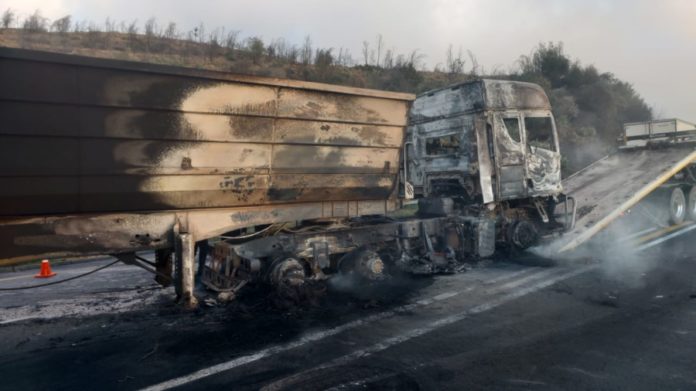The Road Freight Association (RFA) has condemned the scenes that played out on the N3 in the early hours of 09 July 2023 as anything else but a coordinated attack on the road freight sector. Both the specific spot on the N3, as well as the timing, were chosen to cause the best outcome in terms of mayhem and disruption.
Road Freight Association condemnation
The road freight sector (trucks) carries 80% of the goods that are moved in and around South Africa, as well as for those countries that trade with international markets and use South African ports for import and export.
Those who attack the road leg of logistics supply chains need to understand that the long-term effects will bring greater destruction to employment levels, and will result in further job losses, as businesses and supporting sectors shrink and trade moves away from South Africa.
However, with regard to freight and the economy of South Africa: Without trucks, South Africa stops. As noted earlier, the scene that played out on the N3 at Van Reenen’s Pass in the early hours of 09 July 2023 was a ruthless attack on the road freight supply chain – and the effects (economic, business confidence, security, law and order and corridor movement) are far-reaching.
Without trucks, South Africa stops
Whilst the immediate short-term losses will run into millions of Rands (including the cost of vehicles, cargo, personal effects, road damage, EMS response, delays in movement and shipping penalties), the long-term impact will be felt in terms of increased security costs into the cost of logistics, higher insurance premiums, higher SARIA cover premiums, higher toll fees, less freight movement through South Africa, closure of freight companies, loss of jobs: the list continues.
- Depending on the category of vehicle, the type and value of the cargo, and the specialised equipment required for the cargo: this can be anywhere between R3 to R10-million. A simple calculation of capital losses (assets and cargoes) of the six trucks destroyed to date amounts to anything between R18 to R60 million;
- The cost of loss of income through businesses closing is far greater: If any of the trucks belonged to a small business – it will have lost its only truck or trucks: This means loss of earnings/revenue for the business, loss of salaries paid to staff who would no longer have jobs (due to business shutdown), loss of revenue through the services and support the business uses (eg. fuel, storage, maintenance, tolls, staff requirements, licencing, etc);
- The potential closure of businesses means fewer transporters available to perform work. Some companies might feel the industry is not a safe/secure environment and so their owners could decide to simply close their business;
- Freight travelling through South African ports (especially the Port of Durban and along the corridor that has been targeted): cargo owners/customers will choose to move cargo through neighbouring countries. This has already been happening as South African ports become inefficient and the surrounding ports develop, improve and drive efficiencies up. South Africa’s “Gateway to Africa” status has been lost and these attacks will further cement the move of transit freight from South Africa to neighbouring countries. Port revenues will drop, as will income through all support and related freight logistics users;
- 7 000 container deliveries are done through the South African ports per day (the Port of Durban does roughly 4 000 containers a day). Any delay along the N3 (- where the majority of containerised freight is destined for the Port – will result in backlogs/delays for imports and exports;
- Depending on the configurations of the vehicles, delays in moving (for trucks) costs the transporter between R5 000 and R7 500 a day (rough estimate of loss of revenue to the 7 000 odd vehicles from various destinations who would be affected for one day delay at various points of entry, and along the N3 corridor) would be around is R35 million – this is the broad road freight sector impact.
Freight travelling through South African ports
The cost to communities where jobs will be lost (those that provide various services to the trucks that travel the routes through South Africa and the rest of the Continent, are not factored in). That figure will increase as freight moves away from South African ports to neighbouring countries.
The N3 is probably the busiest corridor in South Africa, carrying far higher volumes of traffic (freight, passenger and light motor vehicles for commercial, tourism and private use) than any other corridor.
The cost to the South African economy
Once again, the cost to the South African economy, taking all the above into consideration, will run into Billions of Rand lost, as business confidence from foreign investors plummets, and those who use South Africa as a transit hub, turn away from us and move to other countries that are SAFER and more efficient.
 However, the more important questions to be answered are: Who is behind this attack, and why. There was no looting of vehicles (therefore not cargo theft in intent), and thankfully none of the drivers or staff on the vehicles were injured or killed.
However, the more important questions to be answered are: Who is behind this attack, and why. There was no looting of vehicles (therefore not cargo theft in intent), and thankfully none of the drivers or staff on the vehicles were injured or killed.
The targeted precision of the attack is worrying. This was well-planned and efficiently implemented. At this point, no group has acknowledged that they are responsible.
If this is the same grouping that has been behind such attacks across the country over the past six years, then action needs to be taken against those who promote, plan and implement such criminal actions. We have heard the Minister of Police refer to economic sabotage and many other forms of description, but it would seem that this behaviour continues unabated.
The targeted precision of the attack is worrying.
If this is, indeed, the work of the All Truck Drivers Foundation (ATDF-SA) and its counterparts relating to the employment of illegal foreigners in the road freight (or any other) sector, then the responsible Department of Employment and Labour, and its inspection structures, must ensure that their responsibility to protect employees and employers from non-compliant labour practices is strictly and swiftly applied.
Whilst the Road Freight Association (RFA) is currently unaware of which companies were targeted and attacked (and whether this was a random choice of trucks or an actual specific set of transporters), it is always those who are compliant and innocent of the complaints or issues raised by others, that get caught up in these activities, and ultimately pay the price of closed businesses and severe cost increases to operations.


